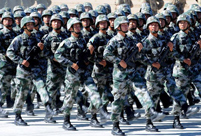 YOG kicks off in Nanjing
YOG kicks off in Nanjing
 Colorful life at Youth Olympic Village of Nanjing 2014 YOG
Colorful life at Youth Olympic Village of Nanjing 2014 YOG
 Royal Taoist temple to open to public
Royal Taoist temple to open to public
 Female soldiers at quake-hit area
Female soldiers at quake-hit area
 Shocking photos of cruel battles in Ukraine
Shocking photos of cruel battles in Ukraine
 Amphibious armored vehicle unit conducts open sea drill
Amphibious armored vehicle unit conducts open sea drill
 Water relay in Henan
Water relay in Henan
 Ethnic culture feasts eyes of travelers
Ethnic culture feasts eyes of travelers
 80 security dogs assembled in Nanjing police dog training base
80 security dogs assembled in Nanjing police dog training base
 Graffiti artists paint on street walls in Xinjiang
Graffiti artists paint on street walls in Xinjiang
Chinese lawmakers are considering renaming the National Security Law, which may be amended with more provisions to combat espionage.
A bill submitted for a first reading at the bi-monthly session of the Standing Committee of the National People's Congress suggests changing the name to the Counterespionage Law.
Explaining the bill to lawmakers, Geng Huichang, minister of national security, said that China's counterespionage agencies face new circumstances and challenges and need stronger support from legislation.
The current law mainly regulates the work of the country's national security agencies, whose major duty is counterespionage work.
The bill introduces new regulations for this work, which has been effective in practice but has not been written into the current law.
Under the bill's proposals, foreign organizations and individuals conducting espionage activities, or who instigate and sponsor others to do so, will be punished, as will domestic organizations and individuals who spy on the country for foreign organizations and individuals.
The bill will give national security agencies the authority to ask an organization or individual to stop or change activities that are considered harmful to national security. If they refuse or fail to do so, the agencies will be entitled to seal or seize related property.
The National Security Law has not been revised since it took effect in 1993.
A national security commission has been set up, headed by President Xi Jinping. At its first meeting in mid-April, Xi said that ensuring national security is a matter of prime importance as China presses ahead with its modernization drive.
Li Wei, a security analyst at the China Institute of Contemporary International Relations, said China has been a "hot target" for espionage from Western and neighboring countries.
An official from the Ministry of State Security, who declined to reveal her name due to the sensitivity of the issue, said there is an urgent need for an anti-spying law with detailed rules.
Recent incidents involving Chinese and foreigners have shone the spotlight on national security.
On Aug 4, a Canadian couple were investigated by the state security agency in Dandong, Liaoning province, on suspicion of stealing state secrets. They are suspected of using their cafe in the city to collect intelligence.
A day later, a master's student who studied aviation at a university in Heilongjiang province was arrested on suspicion of selling more than 50 batches of confidential information to overseas spy agencies for more than 200,000 yuan ($32,000).
 Special holidays
Special holidays World's top 10 fighters
World's top 10 fighters 'Stewardesses' serve in hospital
'Stewardesses' serve in hospital Beautiful night scenery of Nanjing
Beautiful night scenery of Nanjing ‘Peace Mission -2014’ joint anti-terror military exercise kicks off in China
‘Peace Mission -2014’ joint anti-terror military exercise kicks off in China Eye-catching guides at the opening ceremony of YOG in Nanjing
Eye-catching guides at the opening ceremony of YOG in Nanjing A female missile launch company of PLA
A female missile launch company of PLA China, the U.S., Britain and the Soviet Union call for Japan's unconditional surrender
China, the U.S., Britain and the Soviet Union call for Japan's unconditional surrender Photo story: How a baby panda grows up
Photo story: How a baby panda grows up Star-leveled nursing home in a small county
Star-leveled nursing home in a small county Evidence of monstrous crime of Japanese invaders
Evidence of monstrous crime of Japanese invaders Foreign models compete with Chinese in Cheongsam show
Foreign models compete with Chinese in Cheongsam show The beautiful pictures of ancient Chinese architecture
The beautiful pictures of ancient Chinese architecture The Muslims involved in relief work
The Muslims involved in relief workDay|Week|Month